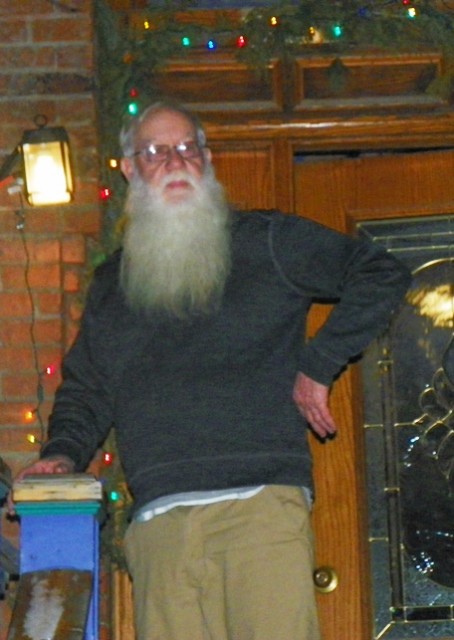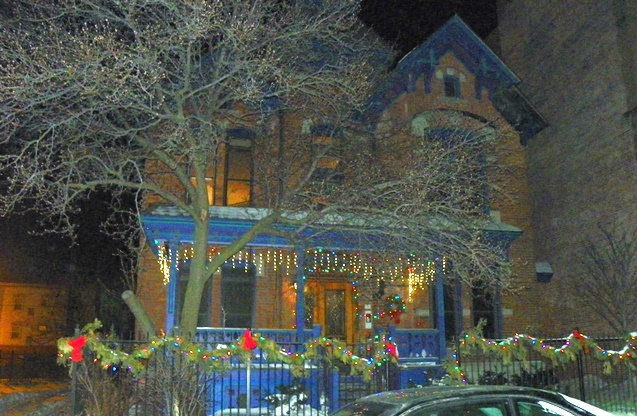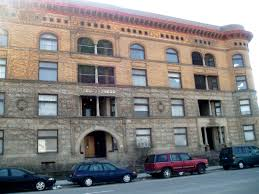
- Baxter Jones and friend Pat Driscoll leaving apartment late Feb. 5 to take him to a hotel, after landlord refused DTE access to restore his power.
Disabled walkway inaccessible, Jones misses doctor’s appointment
Landlord Patrick Dorn of CCNDC: “Jones brings all his problems on himself”
By Diane Bukowski
February 6, 2015
Editor’s note Feb. 7: For unknown reasons, the protest referenced above was canceled. Voice of Detroit was not told about the cancellation until we arrived to cover the protest.
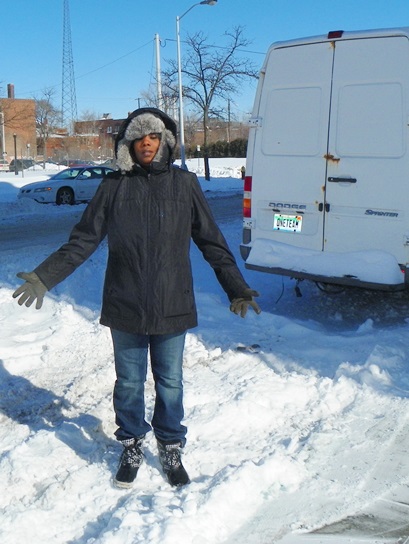
Jones niece Psyche shows snow blocking entrance to disabled walkway. She feared her small car would get stuck. Later another car parked there, further blocking access. “Handicapped sign” is not visible for drivers.
DETROIT – Baxter Jones, a widely known activist with the Beat Back the Bullies Brigade and other organizations, had a traumatic day Feb. 5, 2015. Jones is wheelchair-bound. He could not get out of his Cass Corridor apartment building, the Coronado Apartments, to keep a doctor’s appointment due to mounds of snow that blocked the “handicapped” walkway.
Then DTE abruptly shut off his lights and heat, leaving him trapped in his apartment in subzero temperatures with no power for his breathing apparatus and other necessities. He repeatedly checked his blood pressure with a monitor as the day wore on.
That evening, his landlord, Cass Community Neighborhood Development Associates (CCNDA), whose executive director is Patrick Dorn, denied DTE access to the building that night. The DTE worker had come out on an emergency call to restore his heat. The landlord’s action forced Jones to relocate with great difficulty to a hotel.
The same day, Fox 2 News reported that Hazel Park veteran John Skelly, 69, died of hypothermia in his house after the power was cut.
“I’d been sick in bed all week with a cold,” Jones said the next day. “DTE did call me this morning and tell me they were able to get in today to turn on the power. But I should have been able to get in last night. I couldn’t sleep in the hotel because it was cold there and I was thinking about everything that happened during the day. The landlord and the people who work for him don’t understand what people with disabilities go through. The whole city is out of compliance. No one is enforcing the Americans with Disabilities Act.”

Katie Levy shovels a small portion of street so Jones’ niece can get her car in to get her uncle out of freezing apartment.
As this reporter drove down Second Avenue to Jones’ apartment that morning, there were numerous pedestrians, many elderly, with walkers and motorized wheelchairs in the streets. Many of the curb cuts for them were covered with snow, some of them after the plows came through and blocked them.
Jones’ niece, who had come to take him to the doctor, stayed with him through a frantic day and night as friends from around the city came to his support. One woman shoveled part of the road. Another contacted DTE to let them know that this was a medical emergency. That evening, a DTE supervisor called Jones to tell him his power would be back on that evening. Shortly thereafter, a DTE worker arrived to turn it on.
Jones and his niece called the after-hours maintenance number so DTE could get into the basement. Then they waited—and waited—and waited, along with the extremely patient and sympathetic DTE worker. They were first told that maintenance would be out there in a half-hour. An hour later, they received a call back that maintenance was not coming because it was not an “emergency.” The DTE worker stayed with them as they called friends again for help, but finally had to leave.
This reporter spoke with Patrick Dorn, the Executive Director of the “non-profit” CCNDC, which renovated the building. Dorn lives right next door at 3547 Cass, in an antique building still sparkling with Christmas lights and decorations, evidently well supplied with heat and lights.
Dorn was told that Jones’ power was off. He was asked about several other complaints Jones had including the walkway, and insulation of Jones’ apartment, particularly the hardwood floor which has no sub-flooring to prevent heat escaping, the door which accesses the “handicap” ramp outside, and blockage on the ramp plus the landlord’s refusal to install a light on the dark corridor.
“Jones brings all his problems on himself,” a hostile Dorn responded. He said the city had inspected the building and cleared it, and that the building was a historic building so changes to the floor could not be made.
He asked why Jones’ utility bill wasn’t paid. Jones pays $620 a month for rent, and an additional $200-$300 in utility costs during winter months. The Coronado Apartments and other buildings in the area were renovated for “low-income” occupants, beginning with $16.7 million in city, state and federal funds for two of the properties, according to Crain’s Detroit business (see link to article at end of story).
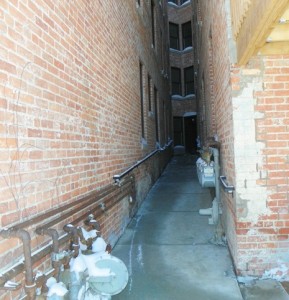
Walkway to Jones apartment, blocked by various appliances. Jones said landlord refused to install light in the dark corridor,
The Crain’s story lists the following public grants that went to the CCNDC development:
“One of the largest investors is Great Lakes Capital Fund, which invested nearly $9 million in equity by financing housing tax credits for the buildings. Other funding partners include:
- Michigan State Housing and Development Authority
- Midtown Detroit
- Detroit Economic Growth Corp.
- City of Detroit HOME loan funds
- Wayne County HOME loan funds
- Cass Corridor Development Neighborhood Development Corp.
- Dearborn Federal Savings
- Michigan State Brownfield and Historic Tax Credits
- Federal Historic Tax Credits
- Smart Grant from the Detroit Economic Growth Council
- Green Grant from Enterprise”
Dorn said the other buildings also charge tenants for heat, a practice becoming common among “non-profit” developers such as Southwest Housing Solutions. Traditionally, most apartment buildings in Detroit have charged only for lights.
After the non-productive maintenance call, Dorn told a friend of Jones that he didn’t have a key to the basement, despite his position with CCNDC and the fact that he himself could have called maintenance to tell them to let DTE in. Dorn was clearly quite comfortable with heat and electricity in his decorated house next door.
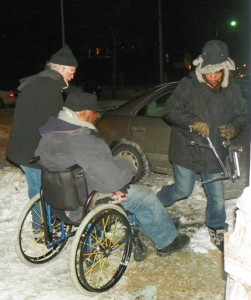
Pat Driscoll and niece Psyche help Jones out of her car so he can retrieve needed belongings for night at hotel. Driscoll had to shovel the street first.
When this reporter returned that night, Jones, his niece, and another friend were helping Jones remove needed items from his apartment so that he could spend the night in a hotel. He did not get there until after 11 p.m., a situation that was totally unnecessary since DTE was ready and available to turn his power back on.
“This morning, this guy Dorn can say a whole bunch of words,” Jones’ niece said. “But he already accomplished what he wanted to last night. His attitude was that he rules, and it’s not his problem. Last night Uncle B suffered for that. Nobody can live like that. I guarantee you that with Mr. Dorn it will not be long before there is another whole situation. I know he wants my uncle out of there, and he’ll keep making him uncomfortable, then he can let a whole other tenant move in and claim money for him. This is a money-collecting organization.”
In fact, IRS forms 990 for the “non-profit” CCNDC show that the vast majority of their income does not come from public grants or other public sources, but from “services,” meaning rent. Their non-profit status is thus questionable.
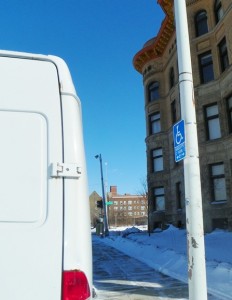
“Handicap” parking sign near disabled access walkway is not visible to drivers, even when vehicle not parked there, unless they happen to glance to the side while passing. Jones said he asked for a “reserved” handicap sign so others could not park there, but was refused. There is also no parking for tenants of the building except on the street, although there is a vacant lot in the rear of the building.
They are partnered with a dozen other FOR-PROFIT groups that own the various buildings they renovated, ostensibly for “low-income” residents.
“It’s false advertising,” Baxter’s niece said.
Addendum: Baxter Jones later told VOD that he was pressured to sign a lease with the building by Jan. 1 of the year he moved in, in order for the owners to get tax credits for having a disabled tenant. But he was not able to move in until March because of access problems. CCNDC, however, charged him rent for January and February. Later, they gave him an eviction notice because he had not put the utilities in his name, which was evidently specified in the lease. Jones, having been pressured to sign so quickly, had not seen that clause, which may have resulted in his NOT signing.
Related article:
Related document:


